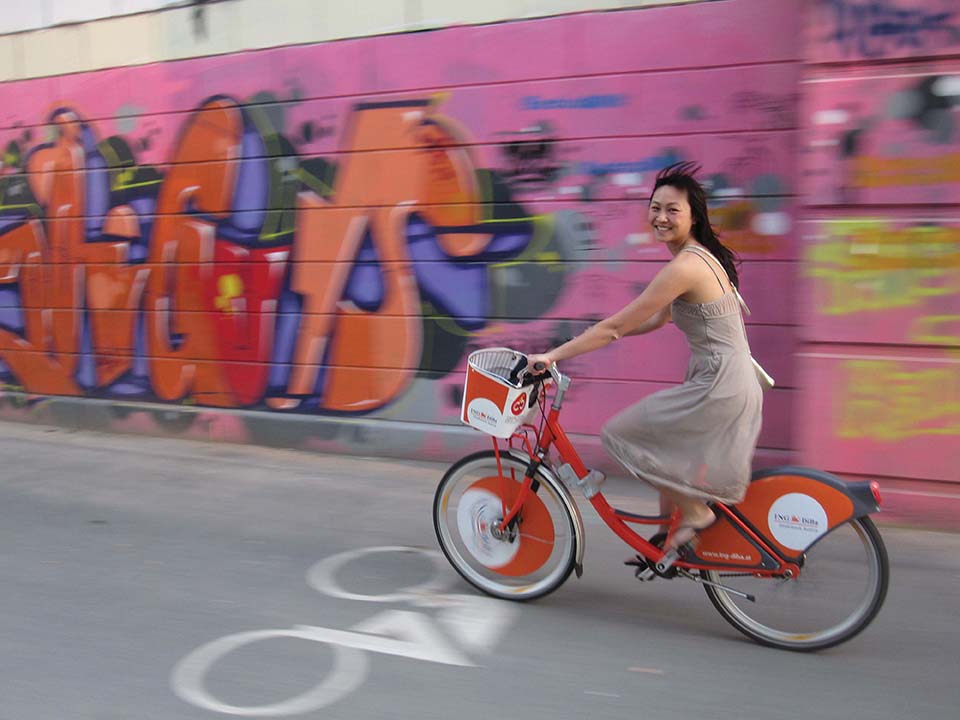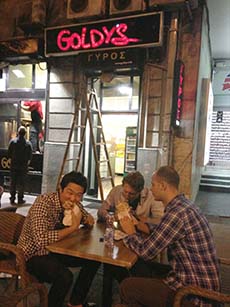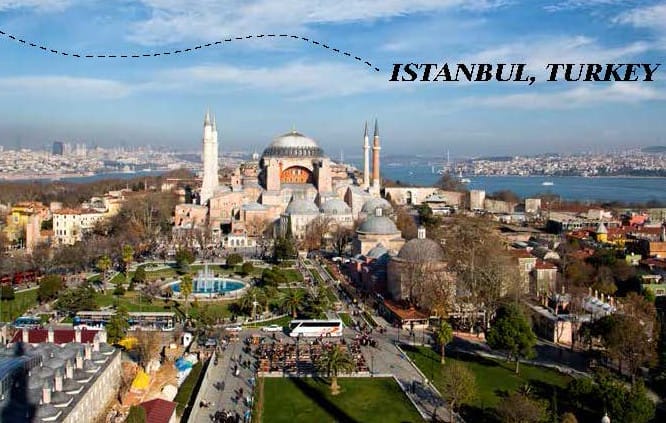
Vienna
Ten days. Seventy-five participants. One mission: to travel from Vienna, Austria, to Istanbul, Turkey, via any route, using any form of transportation except air travel, while racking up race points along the way. This is the basic formula for Culture Quest, a groundbreaking Lauder Institute course that combines experiential learning with a fast-paced, multi-country romp. This year’s iteration, themed after the Orient Express, took place in May. Culture Quest participants were eager to embrace the challenge—or better yet, challenges.

Team Buddy Moon earned “photo of the day” points for this snapshot during the “Orient Express” Culture Quest.
While plotting the route of her team, “Off the Grid,” second-year student Katie Littlefield recalls looking at the map and thinking, “It’s not a matter of if things are going to go wrong, but when and where.”
Language barriers were an obvious impediment to all the teams. Bulgaria posed a particular challenge. Fellow second-year Lauder student and Off the Gridder Wallrick Williams recalls a famous subway map in the capital Sofia designed for tourists, but written entirely in Cyrillic.
“No one would be able to read that,” he says. “Pretty much all of the languages that we knew didn’t help us.”
Nicholas Majka, WG’13, G’13, tried to talk to people, but many didn’t speak English, or any other dialect he knew.
“Maybe the Croatian I learned yesterday isn’t useful in Slovenia today. There was a lot of charades and pointing,” he recalls.
Transportation also posed a challenge. Team “Variety Pack” rode an overnight train from Serbia’s capital, Belgrade, to Sofia, only to learn that in the middle of the night, the train was scheduled to split in two, with each half traveling to a different city, as second-year Lauder student Meghana Mudiyam tells it.
“We asked a million people to make sure we were in the right half,” she says (which they managed to do).
Transportation safety was sometimes a cause for concern too. On second-year Karan Raturi’s first overnight train, he was given a steel chain by the conductor to tie shut the sliding door. “They told us we needed to watch out for Hungarian bandits that might show up while you’re asleep,” Raturi says. Instead of worrying though, his team enjoyed the thrill, playing pranks on each other throughout the night.
Overnight rides, however, meant a lot of early-morning border crossings, passport presentations and questions from border guards.
“It’s pretty confusing to explain to an immigration authority that you’re a group of MBA students doing a trek across Eastern Europe,” says Raturi.
The long stretches of travel, with the obstacles and interruptions, also presented many benefits—perhaps the best being to bond with teammates. “It’s one thing to travel for work or travel with old friends, but to travel with your classmates and form meaningful friendships, I think that’s really what Lauder’s all about,” says Littlefield.
Of course, the Lauder Institute is and has always been more than that. The international business program has a 30-year tradition of preparing future business leaders through a joint degree program in international management—a master’s degree in international studies from Penn’s School of Arts and Sciences and a Wharton MBA or a JD from Penn Law. The long-established degree program has changed careers and lives. Culture Quest has become a highlight in only a few years of existence.
The class evolved from a lunch between Professor Mauro Guillen, the director of the Lauder Institute, and a group of students and alumni three years ago. In just a 20-minute conversation with then-student Davis Smith, WG’11, G’11, they had designed the course’s structure, modeling it after the popular reality television show The Amazing Race. The inaugural Culture Quest took place in May 2011 in Central America, and the second “season” led students throughout South Africa.
Students compete in teams that they form themselves. The competitive aspect comes in the form of racking up points, which are won through a long list of suggested activities developed by a student rules committee. Educational elements are incorporated through a pre-Culture Quest lecture, assigned readings, a post- Culture Quest paper and a panel discussion with local alumni at the final destination. Teams were invited to document their travels using the blogging platform Tumblr. The “suggested” route this year began in Austria and moved through Hungary, Romania and Bulgaria, ending in Turkey, but teams were encouraged to deviate and design their own adventures.
Guillen, who approved the itinerary and designed the curriculum, says that the route was appealing for several reasons.
“There’s a very interesting historical angle,” he says. “You start in Vienna, which used to be the capital of the Hapsburg Empire, and you end in the capital of the former Ottoman Empire.” He was also happy to hold programming in a region that was new to most participants.
For the teams themselves, Culture Quest presented an opportunity to design a 10-day trek unique to their interests.
For Majka and his teammates, their travels were defined by their plan to skim the Croatian coast and visit Albania before continuing east to Turkey. In all, they visited nine countries and traveled 1,519 miles. They called themselves “Team Buddymoon,” as he and his now wife, Annie Wang, C’05, WG’13, G’13, were married the day before graduation and used this trip as their honeymoon, accompanied by a mutual friend and classmate. In addition to their country preferences, Team Buddymoon planned the trip around a shared passion—food.
“Every meal we had was a meal from that country,” Majka says. “The great part about exploring is you see the difference in the cuisine. The fishing, the kinds of beer, kinds of wine, crops they’re growing; the agricultural mix was showing up on the table.”
Food and drink provided memorable moments for many of the teams. Mudiyam and Variety Pack—a team so named because of its diverse representation of Lauder language tracks—fondly recalls a meal in Sofia at a restaurant that claimed to offer a dish representing each of the country’s 161 monasteries.
“The menu they gave us was like an encyclopedia,” she says. Cooking tips from different monastery kitchens peppered the list of dishes.
Mudiyam’s team also nabbed points for the most coveted task— crashing a wedding. She and her teammates were invited to take part in wedding photos in Belgrade.
“It was so much fun to be a part of their special day,” she says.
Raturi, whose six-person team consisted of two classmates and all their girlfriends, took part in a wine tasting in the dungeon of a castle in Bucharest, Romania, which they only knew about from reading the list of Culture Quest point opportunities.
“It’s hard to be in the know in Eastern Europe when you’ve never visited before,” he says. For that, he and his teammates were grateful for the pre-established point system.
Some teams took Culture Quest as an opportunity to delve more deeply into one or two countries. Romania’s vampire legend inspired Littlefield and the rest of Off the Grid to rent a car and spend a night in a Romanian countryside village in their hunt for Vlad the Impaler’s birthplace.
“There’s sort of a cultural belief that there’s something magical or spiritual about Romania that can’t be explained,” says Littlefield. “People are very proud of that part of their culture.”
Pride was a recurring theme throughout the journey. One of the Culture Quest teams was made of undergraduate students from the Huntsman Program, the four-year interdisciplinary undergraduate course of study that integrates business education, advanced language training and a liberal arts education, and they were struck by the amount of pride the locals had in their countries and hometowns. About Serbian youth, for instance, junior Abhi Ramesh notes, “Despite the fact that they’ve gone through so much, they have no doubt that they’ll live there and raise their kids there.”

Lauder Culture Quest participants always dig into the local cuisine: in this case, Panda Express late night.
The Lauder Institute also makes a point of inviting prominent locals—the Wharton alumni—to participate in the course. Meeting with prominent alumni in their hometowns served as the perfect bookend to an extraordinary journey filled with constant cultural and linguistic adventure.
For Culture Quest 2013, Vedat Sadioglu, W’86, a member of Wharton’s Executive Board for EMEA and partner and manager at Kapital Real Estate, hosted all the participants for a panel on private equity at his home in Istanbul at the conclusion of the event. Panelists included Actera Group Vice President Ali Ispahani, W’00, and Turkven Private Equity Principal Ali Nalbantoglu, WG’05, with Sami Habbab, W’98, co-president of the Penn and Wharton Club of Turkey and CEO of Delta Rubis Petroleum, serving as moderator. For Sadioglu, the finish-line event was in part a chance to show how Turkey’s own history has contributed to the development of the region.
“The students had the opportunity to observe the influence of centuries of interactions with the Ottoman Empire in Eastern Europe while they traveled in Austria, Serbia, Croatia and Bulgaria. Once they reached Turkey, they had the chance to witness how it has been influenced by the West and see that it is now one of the most modern, developed countries among those visited,” he says.
Culture Quest participants raved about the panel itself.
“To be in Istanbul and see daily life and then have a lecture on Turkish private equity and macroeconomics, the concepts seem so much more tangible than on a slide deck in Huntsman Hall,” says Littlefield. “You’re going to go out and see the economy later that day.”
Members of the alumni community also popped up along the route. Majka and Wang met a classmate in Sofia, and Ramesh and his Huntsman teammates randomly encountered a Wharton alumnus in Bratislava, Slovakia, while sitting at a café. They shared a three-hour conversation and exchanged contact information.
Guillen has involved alumni in the program since its inception. In Central America two years ago, Max Harari, W’90, spoke to participants about the history of Panama and growth in its real estate sector, and Anthony Hamilton-Russell, WG’90, welcomed students into his South African winery in 2012.
For all participants, Culture Quest was a time for great adventure, but also for reflection about their current and future place in the international business community. “It’s about really thinking, what are the opportunities for business in these places? What are they going to look like in five, 10, 15 years?” asks Majka.
The impact of history on the present was a resonating theme for many.
“A textbook doesn’t quite capture it,” says Williams. “You don’t feel it when you just read about it, but when you see it, it’s like, wow, it wasn’t really that long ago, and it’s still going on.”
Overall, the journey provided the chance to put knowledge gained in the classroom into action while getting course credit. That was the intent. In the end, the program is distinctly Lauderesque in its approach.
“We always emphasize how you can see what is going on today in various countries by looking at their histories,” says Guillen. Despite the differences in culture and development in the countries along the route, “you can’t understand one of them without understanding its neighbors.” The spirit of Culture Quest, says Guillen, is “to see change in action; to see what’s going on in the world, on location, right in front of your eyes.”



























